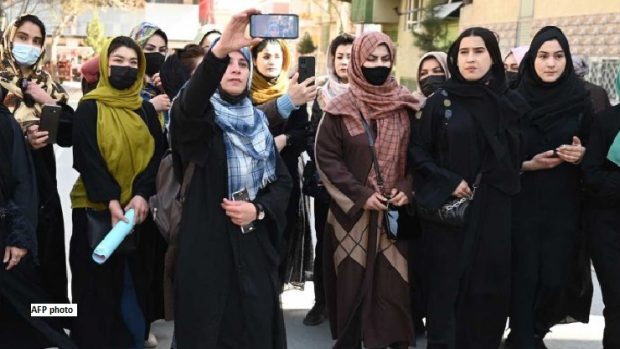
Afghanistan is world’s most repressive country for women: UN
PTI, Mar 8, 2023, 3:06 PM IST

Since the Taliban takeover of Afghanistan, the country has become the most repressive in the world for women and girls, deprived of many of their basic rights, the United Nations said Wednesday.
In a statement released on the International Women’s Day, the UN mission said that Afghanistan’s new rulers have shown an almost “singular focus on imposing rules that leave most women and girls effectively trapped in their homes.” Despite initial promises of a more moderate stance, the Taliban have imposed harsh measures since seizing power in August 2021 as US and NATO forces were in the final weeks of their pullout from Afghanistan after two decades of war.
They have banned girls’ education beyond sixth grade and women from public spaces such as parks and gyms.
Women are also barred from working at national and international nongovernmental organisations and ordered to cover themselves from head to toe.
“Afghanistan under the Taliban remains the most repressive country in the world regarding women’s rights,” said Roza Otunbayeva, special representative of the UN secretary-general and head of the mission to Afghanistan.
“It has been distressing to witness their methodical, deliberate, and systematic efforts to push Afghan women and girls out of the public sphere,” she added.
The restrictions, especially the bans on education and NGO work, have drawn fierce international condemnation.
But the Taliban have shown no signs of backing down, claiming the bans are temporary suspensions in place allegedly because women were not wearing the Islamic headscarf, or hijab, correctly and because gender segregation rules were not being followed.
As for the ban on university education, the Taliban government has said that some of the subjects being taught were not in line with Afghan and Islamic values.
“Confining half of the country’s population to their homes in one of the world’s largest humanitarian and economic crises is a colossal act of national self-harm,” Otunbayeva also said.
“It will condemn not only women and girls, but all Afghans, to poverty and aid-dependency for generations to come,” she said. ”It will further isolate Afghanistan from its own citizens and from the rest of the world.” At a carpet factory in Kabul, women who were former government employees, high school or university students now spend their days weaving carpets.
“We all live like prisoners, we feel that we are caught in a cage,” said Hafiza, 22, who goes only by her first name and who used to be a first-year law student before the Taliban banned women from attending classes at her university.
“The worst situation is when your dreams are shattered, and you are punished for being a woman.” The UN mission to Afghanistan also said it has recorded an almost constant stream of discriminatory edicts and measures against women since the Taliban takeover — women’s right to travel or work outside the confines of their home and access to spaces is largely restricted, and they have also been excluded from all levels of public decision-making.
“The implications of the harm the Taliban are inflicting on their own citizens goes beyond women and girls,” said Alison Davidian, the special representative for UN Women in Afghanistan.
No officials from the Taliban-led government was immediately available for comment.
At the carpet factory, 18-year-old Shahida, who also uses only one name, said she was in 10th grade at one of Kabul high schools when her education was cut short.
“We just demand from the (Taliban) government to reopen schools and educational centers for us and give us our rights,” she said.
Ahead of the International Women’s Day, about 200 Afghan female small business owners put together an exhibition of their products in Kabul. Most complained of losing business since the Taliban takeover.
“I don’t expect Taliban to respect women’s rights,” said one of them, Tamkin Rahimi. ”Women here cannot practice (their) rights and celebrate Women’s Day, because we cannot go to school, university or go to work, so I think we don’t have any day to celebrate.” The UN Security Council was to meet later Wednesday with Otunbayeva and women representatives from Afghan civil society groups.
According to the statement, 11.6 million Afghan women and girls are in need of humanitarian assistance.
However, the Taliban are further undermining the international aid effort through their ban on women working for NGOs.
Udayavani is now on Telegram. Click here to join our channel and stay updated with the latest news.
Top News
Related Articles More

RAW official was involved in assassination plot of Sikh separatist leader Pannun: Report

Pakistan’s Foreign Minister Ishaq Dar appointed as deputy prime minister

Elon Musk in Beijing amid efforts to promote Tesla’s autonomous driving tech

Retrial of Harvey Weinstein unlikely to occur soon, if ever, experts say

Three women from India killed in US car crash; their Gujarat village holds prayer meeting
MUST WATCH
Latest Additions

Suniel Shetty teases new project, says can’t wait to get back into ‘action’

Revanna Case: BJP vows to seek maximum penalty for accused

Will push for full might of law against accused: BJP on Revanna case

Caste still a major factor in selection of candidates in Gujarat: Political analysts

Delhi HC directs police to provide security to transgender candidate for election nomination
























